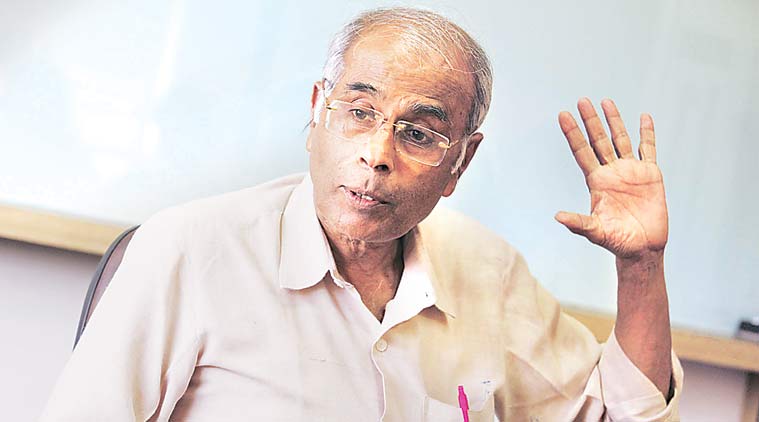Stay updated with the latest - Click here to follow us on Instagram
Black Magic Act: First conviction now course material for police training
The state has till now registered 150 cases under the Act.
 Dr Narendra Dabholkar was shot in Pune on August 20, 2013.
Dr Narendra Dabholkar was shot in Pune on August 20, 2013.With the state police being imparted training to deal with godwomen and godmen, the first conviction under the Anti Black Magic and Superstition Act is being used as the primary material to study nuances of the investigation that helped in the country’s first conviction under the Act.
The Maharashtra Prevention and Eradication of Human Sacrifice and Other Inhuman Evil and Aghori practices and Black Magic Act 2013, for which rationalist Narendra Dabholkar had campaigned for a long time, was brought in by the government shortly after the activist’s murder exactly two years ago.
On August 20, 2013, Dabholkar was shot dead by two unidentified bike-borne men while he was out on a morning walking in Pune. The case that was transferred to the Central Bureau of Investigation (CBI) in May 2014 still remains unsolved.
In the first, and probably only case across the country where an ‘exorcist’ along with two others were convicted for indulging in “Aghori practices and black magic” to “cure” a 29-year-old woman, the Bhandara Chief Judicial Magistrate, earlier this year, convicted three women under the new Act. No other state has a law against black magic till now. Policemen across the state are now being trained by activists about the cases where the law is applicable.
The state has till now registered 150 cases under the Act.
Mumbai Police spokesperson Dhananjay Kulkarni said in the absence of case laws and convictions, the policemen found it difficult to determine the cases where the law was applicable since it had to be interpreted. “Conviction like the Bhandara one helps our officers learn the right approach in cases where the law is to be applied and the kind of evidence to be collected to secure conviction,” he said.
The case in question dates back to May 2014, when Rajyashree Vahane, a Bhandara resident, approached the city police station alleging that her mother-in-law, along with another relative, had got a “woman exorcist” to their residence to “cure” her. “I was staying with my in-laws and had frequent disputes with them. On April 28, 2014, it was amavasya (new moon night) and my mother-in-law got a woman exorcist to ‘cure me’. The woman had her hair loose and started swaying her head fervently like she was possessed. She started chanting something and had brought along lemon, shell, one black threat, betel nut, turmeric and red lead,” Rajyashree told The Indian Express.
Following this, Rajyashree approached the Bhandara city police station where after some persuasion, the policemen came to her residence the next day. Sub-inspector Tukaram Gabhane, the investigating officer, said, “We found lemon, shell, one black threat, betel nut among other things. We then registered a case under the anti-black magic Act.”
The police arrested Poornima Wahane (61), the mother-in-law; Nirmala Wahane (60), another relative; and Vishvakala Kamble (55), the ‘exorcist’. Gabhane said it was his superior inspector Maruti Shende who knew about the Act and told him to apply it. Shende said he had purchased the book containing the Act and thus knew about it.
The case went for trial in July last year. During the eight months of the trial, two of the five witnesses turned hostile, but Rajyashree’s unflinching testimony and the material found by the police at her home were appreciated by Bhandara Chief Judicial Magistrate M S Lone. The accused were pronounced guilty on February 12 this year. Delivering his judgment, Lone observed, “…since long such Aghori practices have affected the healthy and safe environment of society. In the night of Amavasya bringing accused No 3 (Kamble) in the house and acting in most weird manner, all the accused persons had tried to injured the mental health of informant Rajyashree… Also, strong message has to go to society that such kind of offences shall be dealt with iron hand of law and there shall be zero tolerance.”
Dr Hamid Dabholkar, son of the slain anti-superstition activist, said, “We are pleased with the first conviction under the Act for which my father lost his life. However, we need to remember that this is just the beginning and there are several instances like non-application of this Act in the Radhe Maa case, which point to the fact that it is still not executed as stringently as it should be.”







